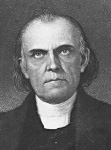Divine revelation dispels all doubt as to the existence of God
In the Bible, the existence of God is from the very first assumed. “In the beginning, God created the heavens and the earth.”1 The doctrine, though formally declared in scarcely a single passage, is represented as fundamental in religion. “He that cometh to God, must believe that he is;”2 and the denial of it is attributed to folly; “the fool hath said in his heart, there is no God.”3 The volume of revelation is a light emanating from the Father of lights, and is, of itself, an independent proof of his existence. As we study its pages, in his light we shall see light; and a more realizing and abiding conviction that he, the great Source of light, exists, will occupy our minds.
The perfect harmony between natural and revealed religion, with respect to this doctrine, confirms the teaching of both. “The heavens declare the glory of God, and the firmament showeth his handiwork. Day unto day uttereth speech, and night unto night showeth knowledge.”4 While heaven and earth, day and night, speak for God, he speaks for himself in his inspired word, confirming the testimony which they give, and completing the instruction which they convey. Revelation never contradicts or sets aside the teachings of natural religion. God affirms, that “the invisible things of him are from the creation of the world clearly seen, being understood by the things that are made; even his eternal power and Godhead.”5 It is no derogation from the authority or perfection of the Scriptures, that we study natural religion. The Scriptures themselves direct us to this study. “Ask the beasts, and they shall teach thee, and the fowls of the air, and they shall tell thee.”6 The same God who speaks to us in his word, speaks to us also in his works; and in whatever manner he speaks, we should hear, and receive instruction.
It is a lamentable proof of human depravity, that men should deny or disregard the existence of God. We read of the fool, who says in his heart, there is no God; of nations that forget God; and of individuals who have not God in all their thoughts. Such persons do not delight in God; and therefore they say, “Depart from us; we desire not the knowledge of thy ways.” Of such atheism, the only effectual cure is a new heart. For the occasional suggestion of atheistic doubts, with which a pious man may be harassed, the remedy is, a diligent study of God’s word and works, a careful marking of his hand in Providence, and a prayerful and confiding acknowledgement of him in all our ways. If we habitually walk with God, we shall not doubt his existence.
The invisibility of God is one of the obstacles to the exercise of a lively faith in his existence. It may assist in removing this obstacle, to reflect that the human mind is also invisible; and yet we never doubt that it exists. We hear the words, and see the actions of a fellow-man, and these indicate to us the character and state of his mind, so as to excite in us admiration or contempt, love or hatred. If, while we listen to his words, and observe his actions, we clearly perceive the intelligence from which these words and actions proceed, why can we not, with equal clearness, perceive the intelligence from which the movements of nature proceed? If we can know, admire, and love, an unseen human mind, it is equally possible to know, admire, and love and unseen God.
Notes:
1 Gen. i. 1.
2 Heb. xi. 6.
3 Ps. xiv. 1.
4 Ps. xix. 1, 2.
5 Rom. i. 20.
6 Job xii. 7.

